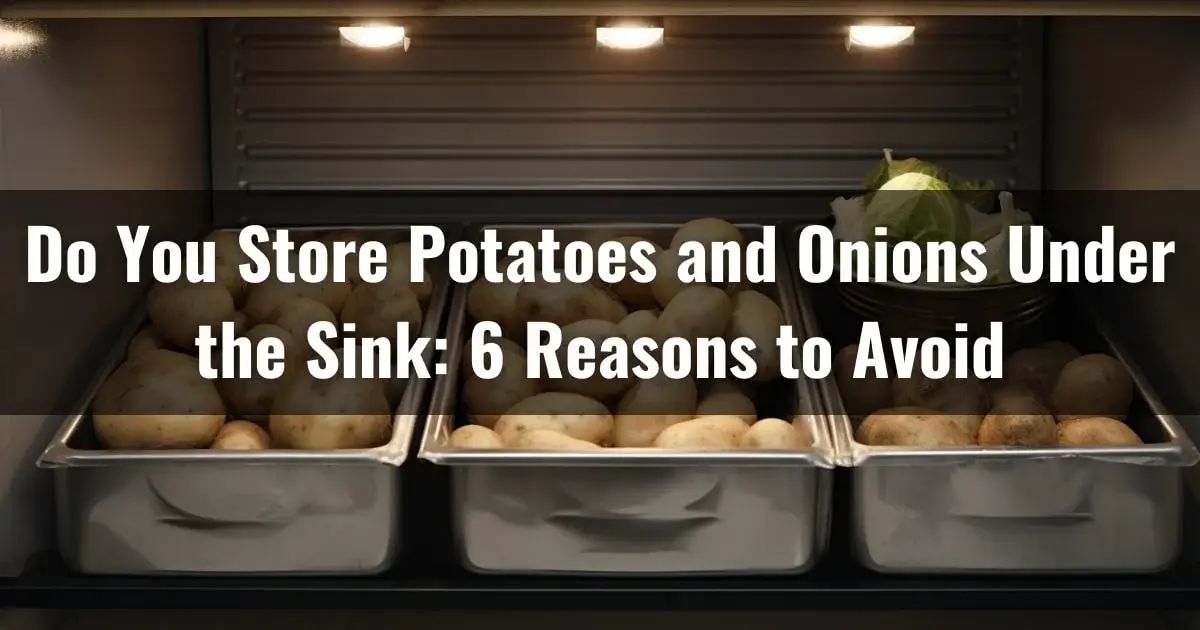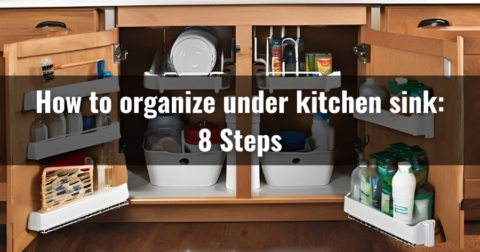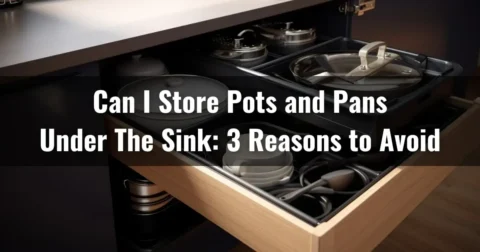Storing potatoes and onions under your kitchen sink might seem like a convenient solution to free up counter space. But before making that decision, you need to consider whether it is the right place to store potatoes and onions.
You shouldn’t store potatoes and onions under your kitchen sink for a lot of reasons. The primary issue is the risk of leaks and moisture in the sink area, which can lead to premature spoilage and sprouting of these vegetables.
To ensure the longevity and freshness of potatoes and onions, exploring alternative storage locations in the kitchen is advisable.
We will discuss the reasons for avoiding storing potatoes and onions under the sink and how to store them in your kitchen properly.
Do You Store Potatoes and Onions Under the Sink: Reasons Not to Do It
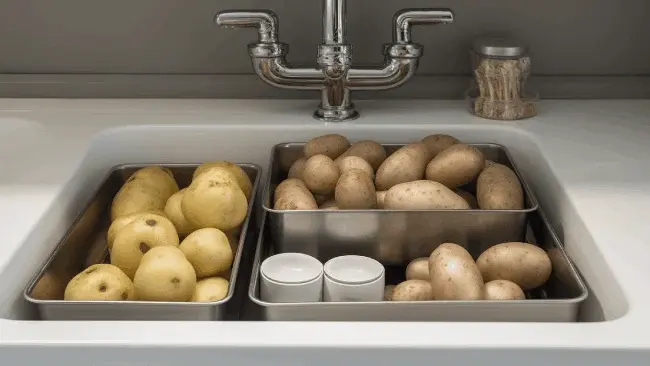
You should refrain from storing potatoes and onions under the sink for several compelling reasons. Here’s what we found:
- Leaks and moisture
- Warmth from the dishwasher
- Pest attraction
- Lack of proper ventilation
- Temperature fluctuations
- Proximity to cleaning supplies
Check out the detailed reasons why keeping potatoes and onions under your kitchen sink is not a good idea.
1. Leaks and Moisture
You should avoid storing potatoes and onions under the kitchen sink because leaks and moisture can cause them to rot and develop mold.
The area under the kitchen sink is prone to water spillage from dishwashing or plumbing issues, making it unsuitable for storing these vegetables.
When exposed to moisture, potatoes and onions can quickly deteriorate, leading to a shorter shelf life and potential waste.
The moisture creates a damp environment that promotes the growth of mold, which can be harmful if consumed. Also, rotting vegetables can release unpleasant odors that may permeate other food items or the kitchen itself.
2. Warmth From the Dishwasher
As a dishwasher is usually located near the sink, you should avoid storing potatoes and onions beneath the sink due to the warmth generated by the dishwasher.
The heat from the dishwasher can create a warm and humid environment under your sink, which isn’t ideal for storing potatoes and onions. This warmth can accelerate the sprouting process and cause the vegetables to spoil more quickly.
3. Pest Attraction
The area under the kitchen sink is vulnerable to pest infestations, which can harm your stored potatoes and onions.
The combination of darkness and humidity can make it an inviting environment for insects and rodents, which could compromise the quality and safety of your stored potatoes and onions.
4. Lack of Proper Ventilation
The lack of adequate ventilation is another important consideration when storing potatoes and onions under the kitchen sink. Proper airflow is essential to keep these vegetables fresh and free from spoilage.
Unfortunately, the area under the sink often lacks the necessary ventilation to maintain the ideal storage conditions.
The trapped gasses released by the vegetables can lead to an environment conducive to mold and bacteria growth, compromising their quality and safety.
5. Temperature Fluctuations
Temperature fluctuations under the sink can cause significant harm to your stored potatoes and onions. These vegetables require a relatively stable and cool temperature to stay fresh and healthy.
Proximity to pipes or appliances can cause significant temperature variations, leading to compromised storage conditions and a reduced shelf life.
6. Proximity to Cleaning Supplies
Placing potatoes and onions under the sink can expose them to powerful cleaning chemicals and other household products.
Exposure to these chemicals and residues can cause significant damage to your stored vegetables, posing a significant risk to food safety.
How to Properly Store Potatoes and Onions in Your Kitchen?
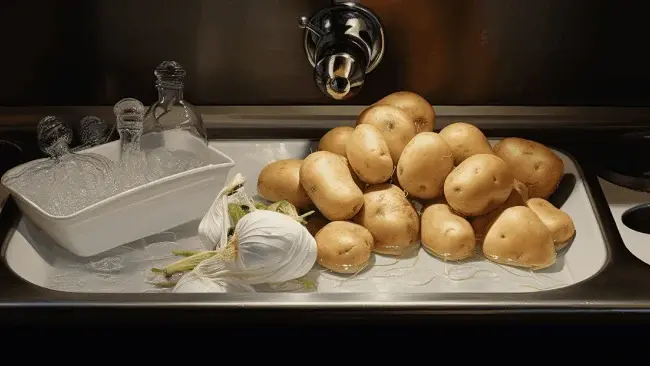
Properly storing potatoes and onions in your kitchen helps extend their shelf life and maintain quality. Here’s what you need to do to store potatoes and onions properly:
1. Choose Suitable Storage Locations
In terms of storing potatoes and onions in your kitchen, the location matters just as much as the containers you use. These root vegetables require specific conditions to maintain their freshness and prevent decay.
For potatoes, your best bet is to store them whole and uncooked in a place that is cool, dark, and dry.
Exposure to sunlight, moisture, and heat can cause potatoes to sprout, rot, or turn green. Our recommendation is that you store them at a temperature between 45 °F (7 °C) to 60 °F (16 °C).
Consider your pantry, cupboard, or cellar if you have one as a suitable storage space for your potatoes. These areas tend to be cooler and less exposed to light and moisture.
If you don’t have access to a designated storage area, try to find a cool and dry spot in your kitchen away from sources of heat, such as ovens or stovetops.
As for onions, they also require specific storage conditions to stay fresh and flavorful. Unlike potatoes, onions prefer a slightly higher temperature range of 45 °F (7 °C) to 55 °F (13 °C). This is because onions contain more water and are more sensitive to low temperatures which can cause them to soften or turn moldy.
Similarly, onions need to be kept in a cool, dark, and dry place to prevent moisture buildup and decay.
To store your onions, look for a pantry, cabinet, or a cool countertop away from direct sunlight and excessive heat.
2. Ensure Proper Ventilation
While choosing the right storage location is crucial, proper ventilation is equally important for storing potatoes and onions in your kitchen. These vegetables need to breathe and release excess moisture to avoid mold and rot.
For this reason, avoid storing them in airtight containers or plastic bags that trap moisture and gasses. Instead, opt for breathable containers like baskets, mesh bags, paper bags, or cardboard boxes with open tops.
When using containers, make sure they are clean and dry before storing your potatoes or onions in them.
You can also add a layer of newspaper or paper towels at the bottom of the container to absorb any excess moisture and prevent the vegetables from touching the surface directly.
Remember to check your storage containers regularly for signs of spoilage or damage, and discard any rotting or moldy vegetables immediately.
Frequently Asked Questions
We found that many people have questions regarding the storage of potatoes and onions in the kitchen. The following questions may also be on your mind:
Can you store potatoes and onions together in the kitchen?
You shouldn’t store potatoes and onions near each other in the kitchen because it can lead to accelerated ripening and spoilage, as well as potential mushiness and leakage.
Onions release ethylene gas, which can speed up the ripening process of potatoes. This can cause them to spoil faster and lose their freshness.
Additionally, potatoes have a higher moisture content, which can affect the texture of onions. The moisture from the potatoes can cause the onions to become mushy and eventually leak.
To ensure both vegetables stay fresh, we suggest you store them separately in cool, dark, and well-ventilated locations. This will help maintain their quality and extend their shelf life until you’re ready to use them.
How far apart should potatoes and onions be stored?
To prevent premature spoilage caused by ethylene gas, it’s advisable to store potatoes and onions a few feet apart in your kitchen.
They should be kept in a different bag, basket, box, or drawer to ensure proper ventilation between them.
A well-ventilated pantry with some distance between the two is an excellent choice for their storage.
This separation helps maintain their freshness and extends their shelf life by minimizing the interaction of gasses and moisture released by these vegetables.
Is it OK to store onions and potatoes in the fridge?
It’s generally not recommended to keep onions and potatoes in the refrigerator. Both vegetables thrive in cool, dark, and well-ventilated environments, which closely mimic the conditions of a pantry or countertop.
Refrigerators are too cold for potatoes and can lead to changes in their taste and texture. On the other hand, the moisture inside the fridge can cause onions to become soft and potentially moldy.
What’s the shelf life of stored potatoes and onions?
The shelf life of stored potatoes and onions, when kept in a cool, dry place with proper ventilation, can extend for several months.
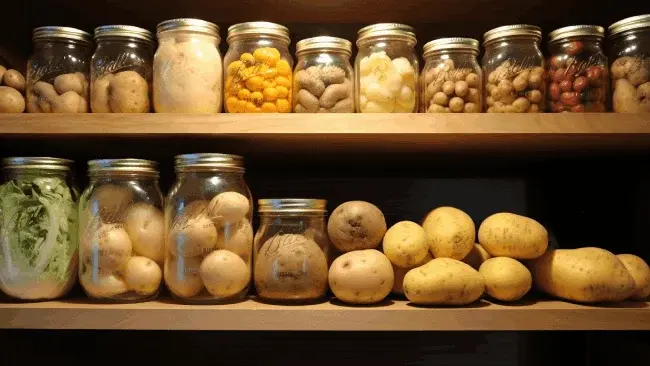
When stored separately and away from moisture, direct sunlight, and temperature fluctuations, both of these kitchen staples can remain fresh and usable.
Potatoes typically last anywhere from 2 to 8 months, depending on the variety, while onions can maintain their quality for a similar duration.
Conclusion
When you consider where to store your potatoes and onions, remember that the kitchen sink is not the ideal choice.
Leaks, warmth from the dishwasher, pest attraction, lack of proper ventilation, temperature fluctuations, and proximity to cleaning supplies all pose risks to the freshness and safety of these essential ingredients.
Instead, opt for cool, dark, and well-ventilated storage spaces like pantries, cupboards, or designated bins. Keep them separate to avoid premature spoilage, and ensure proper airflow with breathable containers.
By following these guidelines, you can maximize the shelf life of your potatoes and onions, ensuring they stay fresh and flavorful for months.
